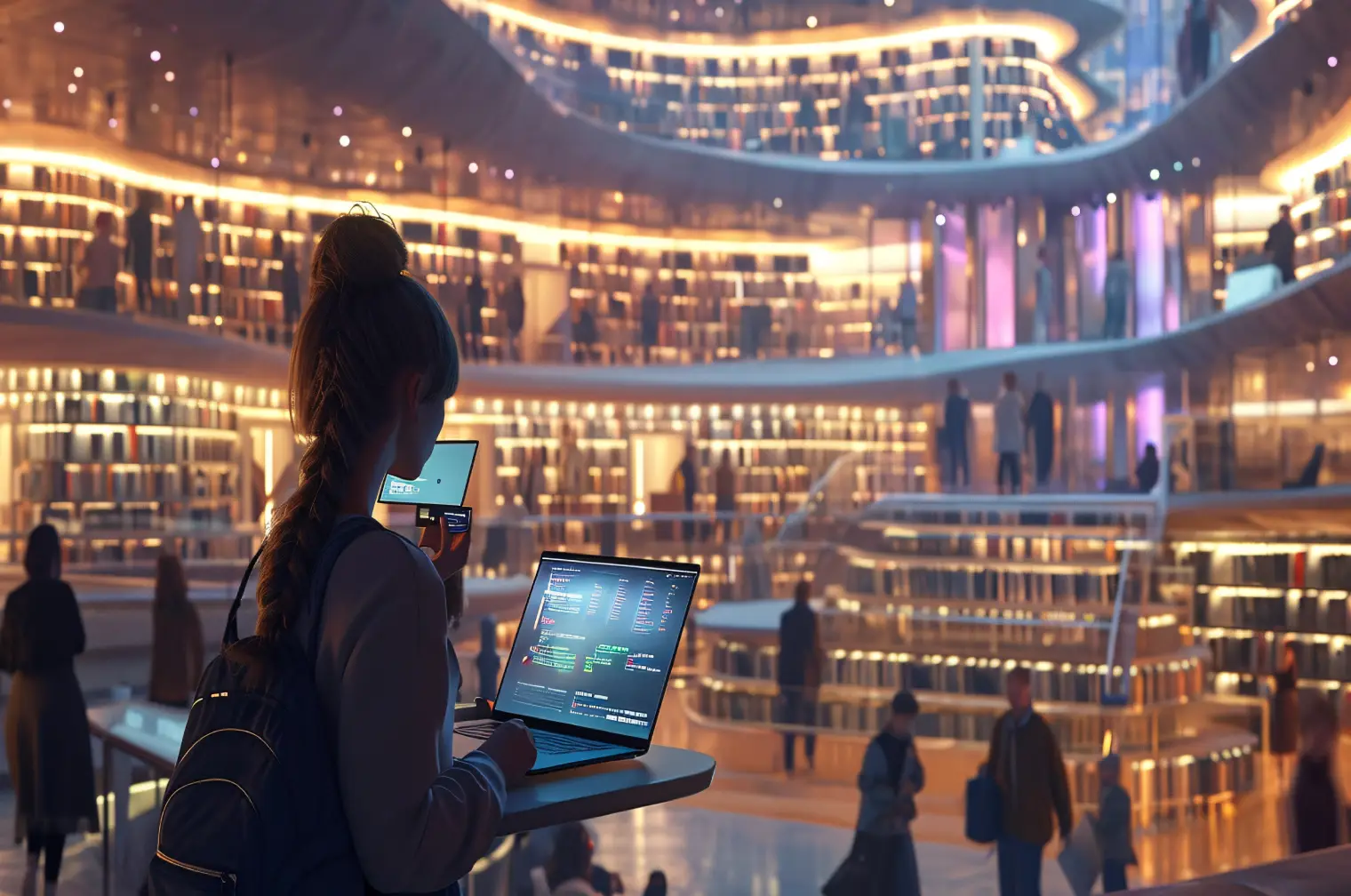The digital experience revolution has fundamentally transformed how cultural institutions serve diverse audiences, with over 80% of visually impaired visitors expressing that they would visit museums more frequently if spaces and content were more accessible.
Today’s museums are embracing digital experience services that bridge physical and virtual worlds, creating inclusive environments where technology serves as the great equalizer.
This exploration shows how modern SaaS solutions are reshaping museum accessibility through innovative digital experience consulting approaches, advanced AI implementations, and cutting-edge interactive technologies that ensure cultural heritage remains accessible to all.
What Is the Current Accessibility Scene in Museums
The museum industry has undergone a dramatic transformation in 2025, driven by legal requirements, technological advancements, evolving visitor expectations, and competitive pressures.
Recent accessibility guidelines mandate that museum applications include text-to-speech functionality, adjustable font sizes, contrast settings, and GPS navigation for visitors with mobility challenges.
This digital transformation extends far beyond compliance. Museums are discovering that accessible design benefits everyone – from older adults to multilingual visitors accessing content in environments with limited connectivity.
The principle of Universal Design emphasizes equitable use, simple, intuitive interfaces, perceptible information accessible to all sensory abilities, and effective sizing that accommodates users of different mobility levels.
Leading institutions recognize that true inclusivity requires both physical accessibility and robust digital experience solutions. Digital collections now require multiple asset versions adapted for different disability types, including audio transcriptions for visually impaired visitors and written transcriptions for hearing-impaired guests.
AI-Powered Solutions Transforming Museum Experiences
Artificial intelligence has emerged as a game-changer in museum accessibility, with institutions implementing AI solutions to serve broader audiences more effectively.
Content digitalization powered by AI helps institutions transcend physical space limitations while ensuring mobility-challenged visitors can access comprehensive museum resources.
The COVID-19 pandemic accelerated digital transformation efforts, leading museums to leverage AI-powered document processing platforms that make archives truly accessible.
These systems process vast collections systematically, organizing and preserving items with long-term research value while making special collections available to global audiences.
Modern digital experience services incorporate machine learning algorithms that personalize visitor experiences based on individual needs, preferences, learning styles, and accessibility requirements.
These intelligent systems adapt content delivery in real-time, ensuring every visitor receives optimized information regardless of their abilities or background.
Design for All with Inclusive Digital Experience
Create barrier-free museum experiences using ViitorCloud’s expert digital experience service tailored for accessibility.
Interactive Technologies: Beyond Traditional Displays
The integration of immersive technologies has revolutionized how museums present collections. Virtual Reality and Augmented Reality enable visitors to explore exhibitions virtually, interact with artifacts digitally, and experience dynamic storytelling through digital overlays on physical objects.
Interactive displays now feature touchscreens for multimedia content access, motion sensors for responsive exhibits, and haptic feedback systems that allow virtual object interaction. These technologies create multisensory experiences that accommodate different learning styles and accessibility needs.
Holographic displays represent another breakthrough, showcasing 3D holograms of artifacts and historical figures that provide lifelike engagement. Interactive projections respond to visitor movement and gestures, encouraging active participation while making learning more dynamic and accessible.
Museums are also implementing customizable interfaces with adjustable font sizes, contrast settings, reading modes, and multilingual options. These personalization features ensure that digital experience consulting approaches address diverse visitor needs effectively.
SaaS Platforms Driving Inclusive Design
Software-as-a-Service platforms have become essential infrastructure for modern museum operations, providing scalable solutions that support accessibility initiatives without requiring massive upfront investments. These platforms offer dedicated Digital Asset Management systems that organize accessibility-focused content versions efficiently.
The key to accessible digital collections lies in creating multiple asset versions adapted for different disabilities. SaaS platforms simplify this process by organizing related digital assets systematically while facilitating seamless third-party sharing when required.
Cloud-based solutions enable museums to implement real-time translations, voice-to-text transcriptions, and adaptive content delivery that makes institutions more inclusive. These platforms provide the technical foundation necessary for delivering consistent digital experience services across multiple touchpoints.
Modern SaaS offerings include automated accessibility testing tools, compliance monitoring systems, workflow management for content adaptation, and analytics platforms that track visitor engagement patterns to optimize inclusive design strategies.
Build Immersive Digital Journeys
Deliver seamless and inclusive virtual museum experiences with our cutting-edge digital experience service.
Case Studies
ViitorCloud’s real-world implementations showcase the transformative power of digital experience services in cultural institutions. Our work with The Museum of Art and Photography demonstrates how comprehensive digital solutions can enhance visitor accessibility while preserving cultural heritage through innovative technology integration. This project exemplifies how modern SaaS platforms can democratize art appreciation for diverse audiences.
Museums worldwide are implementing mixed reality experiences that combine virtual and augmented reality elements, creating immersive experiences that bridge physical and digital worlds. ViitorCloud’s approach to revolutionizing museum experiences showcases how AI-powered solutions can transform traditional exhibition spaces into interactive, accessible environments that accommodate visitors with varying abilities and learning preferences.
Our innovative work in lighting up the museum environment demonstrates how digital experience consulting can create dynamic, responsive spaces that adapt to visitor needs while maintaining the integrity of cultural artifacts and storytelling.
These implementations demonstrate industry commitment to inclusive design principles and technology-driven accessibility improvements, with ViitorCloud’s comprehensive approach serving as a blueprint for institutions seeking to balance innovation with preservation while ensuring universal access to cultural experiences.
Future-Proofing Museum Digital Experiences
Looking ahead, museums must prepare for evolving accessibility requirements, emerging technologies, changing visitor expectations, and regulatory updates. The integration of seamless technology will continue transforming museum visits through enhanced accessibility features, personalized content delivery, and adaptive user interfaces.
Future digital experience consulting strategies must encompass comprehensive accessibility audits, staff training programs, technology integration planning, and ongoing compliance monitoring. Museums need partners who understand both cultural preservation requirements and cutting-edge accessibility technologies.
The rise of sustainable digital practices, preservation-focused solutions, global accessibility standards, and governance frameworks will shape future museum operations. Institutions must balance innovation with preservation while ensuring inclusive access remains central to their mission.
Make Digital Culture Accessible
Empower every visitor with intuitive, accessible interfaces using ViitorCloud’s digital experience service.
We Are Your Partner in Digital Experience Excellence
Museums seeking comprehensive digital experience services require partners who understand both cultural sensitivity and technological innovation. ViitorCloud specializes in developing custom AI solutions that enhance visitor engagement while ensuring accessibility compliance across all digital touchpoints.
Our expertise in digital transformation enables cultural institutions to implement scalable SaaS platforms that support diverse visitor needs. We provide end-to-end digital experience consulting that encompasses accessibility auditing, technology integration, staff training, and ongoing optimization.
ViitorCloud’s AI development services create intelligent systems that personalize museum experiences while maintaining the highest accessibility standards. Our solutions include automated content adaptation, multilingual support, real-time accessibility features, and comprehensive analytics platforms that help institutions understand and serve their diverse audiences effectively. Contact us to learn how our digital experience services help your museums.

Mit Shah
Mit Shah has been creating immersive experiences and delivering games for various platforms for over 9 years.
